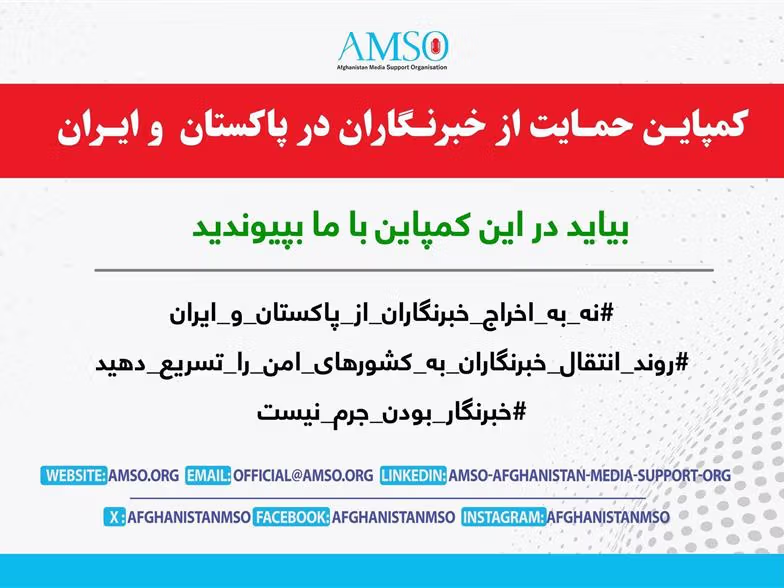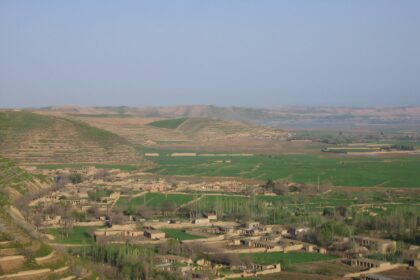RASC News Agency: The Media Support Organization has announced the launch of an urgent international campaign aimed at halting the forced deportation of Afghanistani journalists from Iran and Pakistan. This initiative seeks to garner global attention, cease mounting pressures on displaced journalists, and expedite their safe relocation to third countries. The campaign’s core messages are resolute and unequivocal:
“Stop the forced expulsion of journalists from Pakistan and Iran.”
“Accelerate the transfer of journalists to safe countries.”
“Journalism is not a crime.”
Organizers emphasize that widespread participation on social media through sharing, amplifying, and endorsing these messages can elevate the voices of these endangered Afghanistani journalists into international forums, compelling urgent diplomatic and humanitarian intervention.
Under the oppressive shadow of the Taliban’s authoritarian regime, freedom of expression in Afghanistan has been systematically eradicated. Journalists once pillars of democratic discourse have become targets of relentless repression, forcing hundreds into exile. This campaign transcends mere symbolism; it is a lifeline for those who have fled Taliban brutality only to confront new perils abroad. If sustained with unwavering commitment and broad-based support, this movement can evolve into a formidable instrument of international pressure on host nations and global institutions to enact immediate protective measures for Afghanistani journalists.
Recently, the Media Support Organization convened an online forum to scrutinize the dire conditions faced by Afghanistani journalists residing in Iran and Pakistan. Participants candidly detailed the expiration of visas, refusal of local authorities to honor official embassy documentation, intensifying security harassment, and escalating economic hardship. In both host countries, police routinely disregard official letters from embassies affirming the journalists’ pending asylum or humanitarian visa processes, effectively stripping these individuals of legal safeguards. This systemic failure exposes a grave disconnect between international protection mandates and their local implementation leaving journalists vulnerable to arbitrary detention and deportation.
Legal precarity is compounded by appalling living conditions. In Pakistan, many journalists live in constant fear of police raids and are forced to spend scorching summer days outdoors, exposed to temperatures soaring to 50°C (122°F), merely to evade detention. In Iran, the refusal to renew visas has relegated many to months of involuntary house arrest, severing their professional and social lives. These debilitating circumstances not only undermine physical and psychological wellbeing but also erode journalistic independence. In the words of one displaced journalist:
“Exile under such conditions is a slow death of the free press. Trapped in isolation and fear, we are no longer journalists but prisoners without walls.”
Despite the existential risks they face, many journalists remain trapped in limbo, awaiting relocation to safe countries. Their applications stagnate for months, revealing a troubling gap between the rhetorical commitments of host nations and tangible action on the ground. Meanwhile, the threat of forced repatriation to Taliban-controlled Afghanistan looms large where the price for independent journalism is often imprisonment, torture, or death. Since the Taliban’s return to power in August 2021, the exodus of Afghanistani journalists has been relentless. Yet Iran and Pakistan already burdened with hosting millions of refugees have institutionalized harsh policies that criminalize displaced journalists through visa restrictions, security crackdowns, and denial of work permits. The lack of legal avenues and protections has left these journalists suspended in a precarious existence, where the specter of deportation perpetually haunts them.
The root cause of this humanitarian crisis remains the Taliban’s systematic obliteration of press freedom within Afghanistan. Their draconian policies have shattered civil society and forced truth-tellers into exile. However, rather than receiving sanctuary, these journalists face additional layers of persecution and abandonment by host nations. The international community’s failure to coordinate a cohesive response has only emboldened the Taliban’s reign of terror by isolating those who dare to document its abuses. As the Media Support Organization starkly warns:
“Should the world fail to intervene decisively, the silencing of Afghanistani journalists will not only be complete within Afghanistan but will extend to wherever they are forced into the shadows, extinguishing the flame of independent journalism and the quest for truth.”






